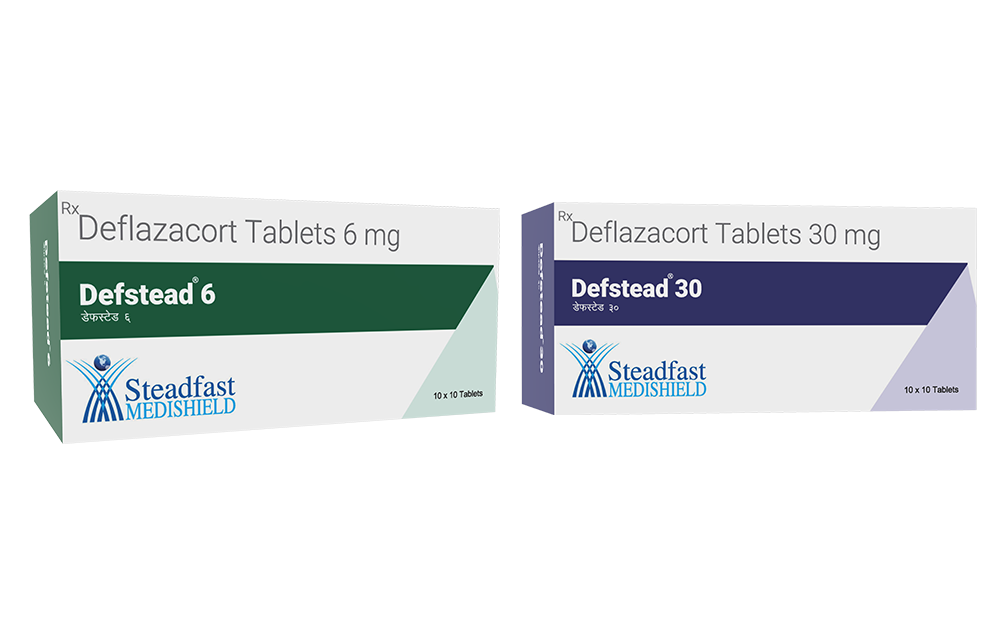Description
Defstead is Deflazacort, a glucocorticoid and an oxazoline derivative of prednisolone with anti-inflammatory and immunosuppressive activity.
Indication and Usage
This medication is a glucocorticoid, prescribed for anti-inflammatory conditions and used as an immunosuppressant. It is a prodrug. Deflazacort is indicated in a wide variety of conditions viz. Nephrotic Syndrome, Transplantation, Systemic Lupus Erythematosus, Uveitis, Duchhene and Dystrophy.
Dose and Administration
Defstead tablets should be taken with food.
Adult: Initially, up to 120 mg daily
Maintenance: 3-18 mg/day
Child: 0.25-1.5 mg/kg/day on alternate days
In cases of hepatic impairment, dose reductions may be needed.
Conversion of dose from Prednisolone to Deflazacort
6 mg of Deflazacort has approximately the same anti-inflammatory potency as 5 mg Prednisolone
Side Effects
Long-term use of high doses of Deflazacort may cause ‘Cushing’s syndrome’. These side-effects usually return to normal once the treatment has been stopped.
Pharmacology
Deflazacort is an inactive prodrug, which is converted rapidly to the active metabolite 21-desacetyldeflazacort. Maximum concentrations of 21-desacetyldeflazacort averaged 116 ng/ml and were observed after 1.3 hours. The terminal half-life was 1.3 hours. 21-Desacetyldeflazacort was cleared significantly faster than both Methylprednisolone and Prednisolone.
Pharmacokinetics
Pharmacokinetics of deflazacort in renal transplanted and hemodialyzed children:
Deflazacort (DFZ) pharmacokinetics was evaluated in fifteen pediatric patients on chronic hemodialysis or after renal transplantation and in three normal children. After overnight fasting, oral DFZ 0.26+/-0.01 mg/kg (mean +/- SEM) was given. Serial blood samples were collected for 360 min and analyzed by HPLC for 21-hydroxy-DFZ (21-HO-DFZ). Serum concentration profiles and pharmacokinetic parameters were similar in patients on hemodialysis, renal transplant recipients and normal children. Elimination of half-life was longer in the 9 cyclosporine-treated subjects (108.0+/-13.6 min) than in the other nine (71.2+/-8.3 min; p <0.02). The finding suggests that from a pharmacokinetic point of view, DFZ dose adjustment for renal function is not necessary in children with chronic renal failure or after renal transplantation.
Contraindications
The medicine is contraindicated in patients who are receiving immunosuppressive vaccines, who have infections and hypersensitivity.
Warnings and Precautions
Caution should be exercised in patients with history of adrenal suppression, infections (ex-chickenpox, shingles, measles) children, elderly, tuberculosis, muscle pain, recent heart attack, high blood pressure, heart failure, liver failure, kidney impairment, sugar, increased eye pressure, osteoporosis, corneal damage, epilepsy, peptic ulcer, under active thyroid, during pregnancy and breastfeeding.
Presentation
10 tablets packed in a strip, 10 such strips packed in a carton.

